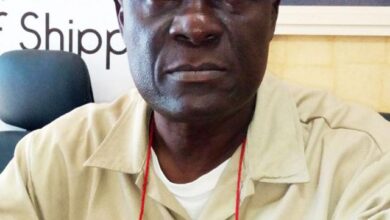Best Option to Optimise Export Potentials for Growing Nigeria’s Economy- Dada, MD ICNL
...Why Kaduna Dry Port is the country's Best Amongst It's Peers

In his first media interview since assuming office,Omotayo Dada the Managing Director of Inland Containers Nigeria Limited (ICNL) spoke with Ismail Aniemu on options available to the federal government to revive the naira and grow Nigeria’s export potentials
He also talked about the company’s operations for the year and how ICNL is impacting the maritime and total logistics areas where it features as a Nigerian company delivering excellence.
Excerpt
Give us an overview of ICNL operations this year in the face of a challenging economy occasioned by the naira’s depreciation of value.
This year, Inland Containers Nigeria Limited (ICNL) has demonstrated resilience amidst economic challenges driven by the naira’s depreciation. The company focused on optimizing logistics operations, enhancing service delivery, and maintaining strong customer relationships.
By streamlining processes and adopting cost-effective strategies, ICNL ensured steady operations while adapting to shifting market dynamics.
What solution(s) would you recommend to government to address the declining exchange rate situation?
To address the declining exchange rate, the government should support AfCFTA agreement by streamlining the bottlenecks that can hinder the seamless process of export trading amongst African countries (Shippers), and strengthen export-oriented policies to boost foreign exchange earnings.
The government should reduce dependency on imports by promoting local production and industries.
It’s also important we revive the export policy to attract export trading and the documentation process within seaport and border areas, to facilitate and enhance revenue to the government and investors.
Government should give grant to farmers and investors to enhance growth of agricultural products.
There is also the need to encourage the service providers like ICD & Terminal operators to provide logistics support for international trade to succeed.
How are you managing cargo haulage by road in spaces where rail should have covered and what is its impact on you?
In the absence of rail coverage, ICNL has optimized road haulage by maintaining a reliable fleet, leveraging technology for route planning, and partnering with trusted logistics providers.
While this ensures efficient cargo delivery, it increases operational costs, wear and tear, and transit time, emphasizing the need for improved rail infrastructure to ease the burden.
Tell us about your potential to handle and process exports taking advantage of the NEPC DEW programme and other export-oriented initiatives by the federal government
ICNL/KIDP is well-positioned to handle and process exports by leveraging the NEPC DEW program and other federal government initiatives. With our strategic infrastructure, expertise in logistics, and commitment to trade facilitation, we ensure seamless export processes. Our focus includes enhancing container handling, supporting SMEs, and promoting agro-exports, aligning with Nigeria’s drive for export diversification.
Your company is parent organization to Kaduna Inland Dry Port. Being the pioneer dry port in Nigeria, what edge stands KIDP out amongst its peers?
Kaduna Inland Dry Port (KIDP), as Nigeria’s pioneer dry port, stands out due to its strategic location in the northern region, providing a crucial gateway for cargo movement to and from northern Nigeria and neighboring countries. KIDP offers enhanced cargo handling capacity, reduces congestion at seaports, and supports trade facilitation with rail and road connectivity.
Its integrated logistics services, coupled with modern infrastructure, making it a key player in promoting intermodal transportation and boosting Nigeria’s export potential.
ICNL is viewed as a Nigerian company operating with industry best practices. Has there been any plan for human capital development for staff?
Yes, ICNL places a strong emphasis on human capital development as part of its commitment to industry best practices. The company is focused on upskilling its staff through ongoing training programs, workshops, and certifications that align with global logistics standards.
ICNL also supports staff in acquiring specialized knowledge in areas such as supply chain management, customs operations, and technology integration. Additionally, leadership development initiatives are in place to nurture future managers, ensuring that the workforce is equipped to meet evolving industry demands.
How are you engaging with the plurality of stakeholders, government and private, in the maritime industry?
ICNL engages with a wide range of stakeholders in the maritime industry, both governmental and private, through collaborative initiatives, policy advocacy, and strategic partnerships.
We maintain open channels of communication with regulatory bodies to ensure compliance with regulations and contribute to policy development.
In addition, ICNL actively participates in industry forums, associations, and conferences to stay informed on trends and share insights.
We also work closely with private stakeholders, including shipping lines, logistics providers, and terminal operators, to foster mutually beneficial relationships that drive operational efficiency and enhance the overall growth of the maritime sector.











